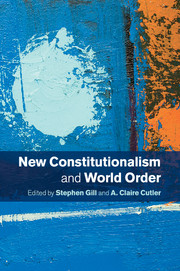Book contents
- Frontmatter
- Contents
- List of Figures
- List of Contributors
- Acknowledgements
- List of Acronyms
- 1 New constitutionalism and world order
- Part I Concepts
- Part II Genealogy, origins and world order
- Part III Multilevel governance and neo-liberalization
- 7 When the global inhabits the national
- 8 New constitutionalism and variegated neo-liberalization
- 9 New constitutionalism and multilevel governance
- Part IV Trade, investment and taxation
- Part V Social reproduction, welfare and ecology
- Part VI Globalization from below and prospects for a just new constitutionalism
- Glossary
- Appendix
- Bibliography
- Index
7 - When the global inhabits the national
Fuzzy interactions
from Part III - Multilevel governance and neo-liberalization
Published online by Cambridge University Press: 05 February 2014
- Frontmatter
- Contents
- List of Figures
- List of Contributors
- Acknowledgements
- List of Acronyms
- 1 New constitutionalism and world order
- Part I Concepts
- Part II Genealogy, origins and world order
- Part III Multilevel governance and neo-liberalization
- 7 When the global inhabits the national
- 8 New constitutionalism and variegated neo-liberalization
- 9 New constitutionalism and multilevel governance
- Part IV Trade, investment and taxation
- Part V Social reproduction, welfare and ecology
- Part VI Globalization from below and prospects for a just new constitutionalism
- Glossary
- Appendix
- Bibliography
- Index
Summary
In much of my work I have been keen on discovering what is obscured by the dominant vocabulary through which a major disciplinary subject is captured, described and researched. In the case of globalization and the neo-liberal project, the focus in this short piece, it is a vocabulary that emphasizes the global and the national as antagonists – what one wins the other loses. This holds whether the perspective on issues/events comes from the left or the right of the political spectrum. Such a dualism functions as a reasonable description and can be intuitively satisfying. Dominant explanations do explain and they are to be taken seriously. Yet their clarity rests partly on the selecting of some features and the discarding of others which wind up in the penumbra around the centre of light. It is in that penumbra around a powerful explanation where I do my research; it has been a key analytic tactic in my work (2007).
In the case of this essay, what I detect is that the global – whether an institution, a process, a discursive practice or an imaginary – is constituted inside the national to a far larger extent than is usually recognized in critical accounts. Far from antagonism I find that particular sectors of the national liberal state have been key makers of the global corporate economy, along with the more familiar makers. This entails a rejection of notions such as ‘globalization weakens the state’ or ‘the rescue of our banks shows us the return of the strong national state’.
- Type
- Chapter
- Information
- New Constitutionalism and World Order , pp. 115 - 125Publisher: Cambridge University PressPrint publication year: 2014
- 4
- Cited by

